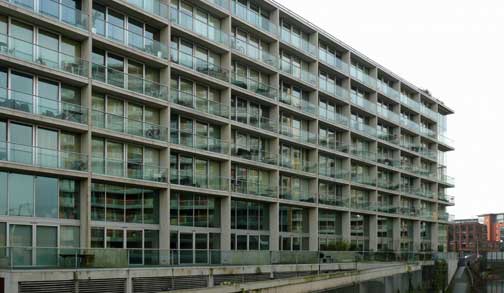

Leaseholders at the fancy Timber Wharf in Manchester are facing a £1 million bill to pay for a new roof, only 12 years after the site was completed.
It is claimed that the building has been beset with leaks within two years of being completed and conditions in some of the flats are so bad that they are uninhabitable.
Several of the penthouses on the top floor have holes in the ceiling where the plaster has come down, and water runs down the walls.
One woman owner in London has reputedly been unable to rent out her property for two years.
Tom Coyle, who bought a £300,000 duplex in 2005, claims he has leaks in the apartment on both the top eighth floor, and on the seventh.
“It is a truly appalling situation here, where some flats cannot be occupied or rented out because of the water,” he said.
The 181-flat development in Castlefield was built in 2002 by fashionable regeneration housebuilder Urban Splash, founded by Tom Bloxham MBE, whose offices are in the building.
As well as being the site’s freeholder, Urban Splash also owns 16 leasehold apartments that are rented out.
All leaseholders have been served a section 20 notice to raise £980,000 for the new roof, meaning contributions will vary between £2,000 and £8,000.
 The money should have been collected by January 25, although it is understood that only a fifth of this sum has been received.
The money should have been collected by January 25, although it is understood that only a fifth of this sum has been received.
LKP was alerted to the issues by residents after two articles appeared on the Manchester Confidential website in December and January.
LKP has asked Urban Splash for a statement to clarify the situation, which has also been copied in to Lucy Powell, the local Labour MP for Manchester Central, and Sir Peter Bottomley, who is heading inquiries into leasehold abuses at Westminster.
Liability for the works is disputed but, astonishingly, has not to date resulted in litigation.
The building was completed by Urban Splash Projects, which has ceased trading, and for some reason – it is claimed – the roof was not covered by the NHBC warranty. The explanation – which has not been subjected to legal scrutiny – is that the warranty did not cover flat roofs.
There are additional issues concerning the maintenance of the building, which are an obligation of the freeholder, in this case Urban Splash.
The residents control the building through the Timber Wharf Management Company, although the managing agent Mainstay was initially appointed by Urban Splash. Indeed, Mainstay manage all Urban Splash’s 18 freeholds.
“It is an on-going nightmare for owners,” said one resident. “Some have not wanted this to be exposed because it could damage the building’s reputation and affect values, but it needs to be brought into the public arena.”

It is understood that BBC’s Rip-Off Britain has been briefed about problems on the site.
It would appear that mortgage lenders are well aware of the problems at Timber Wharf, with sales falling through owing to the on-going problems at the site.
The problems at Timber Wharf are a serious embarrassment for Urban Splash, which was founded by Bloxham shortly after he was a student in Manchester.
With his Japanese pyjama suits, trilby and peroxide goatee beard, Bloxham stood out as the epitome of cool amid the other suited and paunchy house-builders.
Throughout the boom years, Urban Splash was credited with a string of major regeneration works in Manchester, Sheffield and the landmark naval dockyard in Plymouth.
But in the downturn, the debts piled up – as they have for most house-builders – and in 2012 Urban Splash was reporting loses of £9.3 million and debts of £234 million.
“Bloxham repeatedly tells us he has not got the money to sort out Timber Wharf and the banks won’t give it to him,” said Coyle.
Another told Manchester Confidential:
“It irks all of us to see Urban Splash boast about all the awards the development has won whilst really the building has never been watertight and had defects from the start, and now the company is leaving the owners to pay the £1m plus bill.
“I, like many owners, struggle to understand how Urban Splash can avoid their responsibilities.”
For its 16 apartments and offices Urban Splash will have to pay £186,000 in contribution to the new roof.
Manchester Confidential reports that it has offered £155,000 towards the costs of the roof, provided the residents waive any legal challenge.
Two weeks ago, Urban Splash is reported as having proposed selling the building’s freehold to raise the £1 million to pay for the work, with leaseholders then paying it back through annual ground rent charges.
At present, the leaseholders pay no ground rent at all.
Property manager Mainstay is being credited in the reports with trying to resolve issues for the leasehold owners, in spite of its commercial involvement with Urban Splash at all its other sites.
One resident said: “Re: Mainstay, let’s just say that a number of us are maintaining a healthy skepticism and think the board of directors (of the residents’ company) need to continue to proactively drive the problem’s resolution.”
LKP will publish Urban Splash’s statement when it is received.
Jill Burdett’s reports for Manchester Confidential can be read here and here
Dear Sebastian
Thank you for your email of 5th February to our Chairman, Tom Bloxham. He has asked me to respond on his behalf.
I note that you say you have been contacted by residents at Timber Wharf. I’m afraid that we are at this point unable to address the questions you have raised.
Please be assured that we are working very hard with residents (via their appointed representatives on the management company), and also with Mainstay, their appointed managing agents, to resolve the issues with the roof and water ingress at the site.
We do not believe that it is in the interest of any of the parties to have this discussion in public, in the press or with third parties, though you may wish to direct any questions to the directors of Timber Wharf Management Limited, or to Mainstay.
Kind regards
Kim Essop
Company Secretary
Urban Splash


 George Osborne’s former nanny faces £100,000 bills and loss of home
George Osborne’s former nanny faces £100,000 bills and loss of home






















The RMC can of course appoint surveyors or engineers rather than mainstays in house team to avoid a conflitct of interest. it means no more fees by doing that. They likley need that advice in order to establish the problem and act accordingly.
It would be very interesting to ask who appointed the board members to the board! Was it Urban Splash or Mainstay? And how many ‘real’ leaseholders are on the board that would be able to influence decisions made. I am not talking about Urban Splash which owns 16 apartments here.
Leaseholders need to find out all these questions, otherwise who is making all these decisions on their behalf?
Landlords and managing agents always rely on apathy from leaseholders. Get involved guys!
One lesson to everybody here is that the 10 years’ building insurance has now expired (even though the roof was not covered) but I bet when all this started the insurance was still in place.
Landlords/MA will always try and delay any actions for as long as they can until it is too late for leaseholders to make a claim.
For anybody else in the same situation: ACT NOW.
According to the the post the building is controlled by an RMC where each leaseholder is a shareholder or member. I agree that they should check who the directors are but in most cases there will have been an AGM, and if there are landlords appointees still on the board, then check the articles to see if they should or can be removed. As posted, if they feel Mainstay have a conflict of interest, they can appoint a consultant to deal with the issues, as they will either be paying fees to them or Mainstay as this sort of issue is outside the average management contract.
I’d check the lease too – “one off demands due on 25th jan” are only due if the lease allows such demands.
Karen,
As with an insurance excess, would a freeholder be liable for any part of a claim made under the NHBC guarantee?
Would a builder’s premium for membership of the scheme be affected by a poor claims record?
Does liability transfer on the sale of the freehold?
Do you agree that if a problem can be deferred beyond the guarantee period the freeholder can gain a financial advantage at the expense of leaseholders?
Liability for the excess on an NHBC Zurich or Architects Warranty depends on the reason for the problem, and therefore in some cases while a landlord can claim on the NHBC and its eyewatering excesses, the balance might be irrecoverable if you can show negligence and fault, but always no so for an inherent defect.
Yes their premium would go up.
Yes liability ruins with the sale.
Yes they could gain a financial advantage, but in this case the obligation to repair and control thereof is with the RMC, so no. Its up to the RMC and/or individual leaseholders to show that the fault arises from actionable causes.
Its a flat roof if they put a “cheap as chips” one on then 12 years is not a surprising interval to see problems. Thats why they have to look at that and the cause, and I’d recommend the RMC appoint its own building surveyors, not mainstays.
Michael
Liability for any development is down to the individual leaseholders who would have their own individual policies and excesses in their names.
The builders membership to any insurance association would not be in jeopardy that I am aware of because as we all know at the sign of any kind of hassle they liquidate companies and then just start up again under a different name…
All liability is transferred to new owners on any sale unless stipulated in the sales contract.
I think landlords win whatever the situation because they do not have any liability with sites.
They make sure when they draw up the leases that all repairs and responsibilities for the upkeep of the building is at the leaseholders expense..even when the landlords have failed to maintain buildings in a timely and proper manner.
If Landlords think they can get any repairs done on the insurance policy they do try to where possible, BUT it depends on how the policy is worded.
Some as we know, exclude certain parts of a development as reported above where the roof is not covered…..
If the landlords or their managing agents arrange for any work to be done on a building then the more unscrupulous of them can take advantage of the situation as I have seen many times in over priced work being sanctioned. Or better still an ‘administration fee’ being added by landlords for having to deal with the repairs to the development which is then sent to leaseholders to pay.
A win win situation which ever way it is done for Landlords….
Quote”even when the landlords have failed to maintain buildings in a timely and proper manner”
Not so- see Continental vs White.
I would also add that with MA/ Surveyors hat on, I have in, and know of, many instances where victories are achieved against the landlord and developer in these sorts of cases. Unless its fairly major, building falls over, or very minor, few would argue that compared to its inception, warranties like the NHBC are no longer what they used to be in value to a home owner, largely as they are reliant on the builders to keep them in funds and operation…………